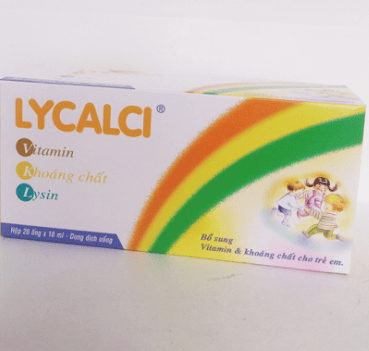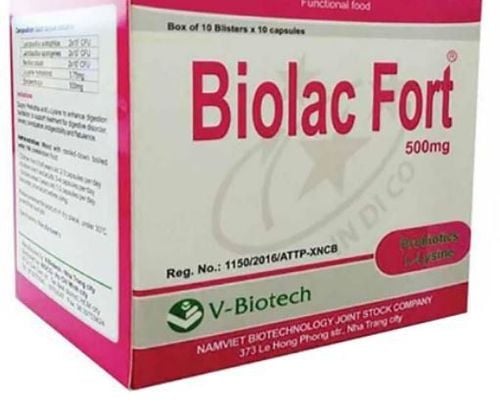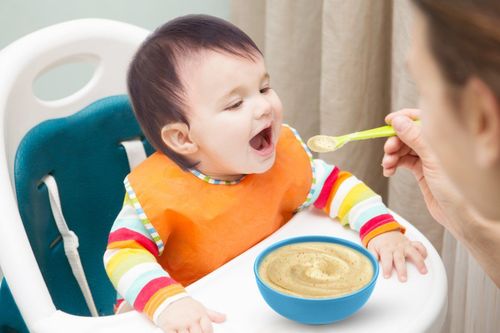This is an automatically translated article.
21-month-old babies have tremendous development in motor skills, language and brain. This is also the time when children begin to develop their own personalities and know how to choose and refuse food. Therefore, nutrition for 21-month-old children is a big challenge for parents. So what can a 21-month-old baby eat?
1. Nutrition for 21-month-old children
Nutrition for a 21-month-old baby is a really important part of life, children need to eat three meals a day and two extra snacks. Some of the nutrients needed by a 21-month-old baby include:
Carbohydrates: glucose from carbohydrates is used by the brain to provide fuel for itself. The amount of carbohydrates needed for a 21-month-old baby is about 130 grams. This is the equivalent amount required for the normal functioning of the adult brain. Protein: Infants require a low-protein diet but for a 21-month-old toddler needs 13 grams of protein per day. Fats: Fats are an essential nutrient for toddlers, the body needs them to absorb fat-soluble vitamins, build cells, move muscles, and clot blood. Sodium: Sodium acts as an electrolyte in the body and it is necessary for nerve function, muscle contraction and blood pressure regulation. Newborns need a minimum of 1 gram per day to function optimally. Iron: Iron is needed for the production of red blood cells that carry oxygen through the blood. Iron deficiency can lead to frequent infections, fatigue and pale skin. Toddlers need 7 mg of iron per day. Calcium: is an important micronutrient needed for the development of bones, teeth and even heart function. A 21-month-old baby is a period of developing motor skills and needs 70mg of calcium per day. Vitamin D: very important for the body's absorption and use of calcium. Children need 300-400 units of the vitamin per day. Water: Toddlers at 21 months need 1.3 liters of water that comes from mixed sources like water, food, and water found in milk. Water makes up 70-7% of body weight and is needed to build large molecules, transport other nutrients, lubricate and cushion organs, and flush toxins out of the body.

Giải đáp bé 21 tháng tuổi ăn gì?
2. What can a 21-month-old baby eat?
21-month-old toddlers have lower caloric needs than infants due to slower growth rates. So, during this period, children need between 1000 and 1400 calories per day depending on their size, physical activity level and age. This means about 1/2 cup of rice, 1 small fruit, 1 cup of cooked vegetables, 1 egg, and 1 glass of milk per day. In addition, children also need a healthy amount of cooking oil in their meals. What does a 21-month-old baby eat? Some good foods for 21-month-old babies that parents can refer to are as follows:
Eggs: eggs can be boiled or beaten and can be served with butter or cheese. Rice: "Can a 21-month-old baby eat rice?" This is a question that parents always ask. However, at this stage, the lower second molar begins to emerge and the child can eat crushed rice. Bread rolls: flatten slices of bread and spread butter, roll to make baby food. Nut butter and jam bread: decorate with some peanut butter and jam to make the bread more attractive. Avocados and hard-boiled eggs: these are two foods that are packed with nutrients and good fats. Fruit: a bowl of any seasonal fruit mix will help improve your child's nutritional quality. Milk: 21-month-old babies can be weaned off breast milk, but parents should do it slowly, skipping a daily feed for at least three to seven days before skipping the next one. If the baby is weaned too quickly, the mother can run the risk of blocked milk ducts and infection.

Quả bơ và trứng luộc là thực phẩm tốt cho trẻ 21 tháng tuổi
3. Some notes when taking care of anorexic children
When children are toddlers and in the period of personality development will not like control. So, if you want your child to be able to feed himself, let him or her eat just the right size food. In addition, there are some issues to note when taking care of a 21-month-old anorexic as follows:
Make sure that the food is rich in vitamin C so that iron can be absorbed. Don't turn mealtime into a battlefield. When you try to force your child to eat, a natural resistance develops. Limit your child's drinking of bottled juice and eat fresh fruits instead. Don't comfort your child by offering him sweets as a reward for finishing his meal. Eat several small meals or snacks instead of 3 large meals. This provides variety and ensures that children do not feel hungry. Start with soft foods and gradually add tough foods such as meat. Let your child sit during mealtimes and discourage running around during mealtimes. Make mealtime fun by telling stories and discourage eating in front of the TV as it interferes with flavor and texture processing. Appreciate children trying new foods, but parents shouldn't force them if they don't like them. In short, a 21-month-old child is a period of comprehensive development not only physically but also in character development. Therefore, children are very picky eaters at this stage and nutrition for 21-month-old children is always a problem that many parents worry about. In order for children to develop healthy and full of necessary nutrients, parents change the way of processing, understand the child's taste preferences to create a diverse environment and eating habits.
Besides, parents can also add necessary nutrients through functional foods. However, priority should be given to foods of natural origin that are easy to absorb, not for children to use many types of food at the same time or continuously change functional foods.
For children to be healthy and develop well, it is necessary to have a nutritious diet in terms of quantity and quality balance. If children are not provided with adequate and balanced nutrients, it will lead to diseases of excess or lack of nutrients, which adversely affect the comprehensive development of children in terms of physical, mental and motor skills.
Children who do not eat properly are at risk of micro-mineral deficiency causing anorexia, growth retardation, malabsorption,... If they notice the above signs, parents should supplement their children with products. The supplement contains lysine, essential micro-minerals and vitamins such as zinc, chromium, selenium, and B vitamins to help fully meet the nutritional needs of children. At the same time, these essential vitamins also support digestion, enhance nutrient absorption, help improve anorexia, and help children eat well.
Parents can learn more:
Signs of zinc deficiency in children
Micronutrient deficiency and failure to gain weight in children
Please regularly visit Vinmec.com website and update useful information to take care of your child. Take care of the baby and the whole family.













